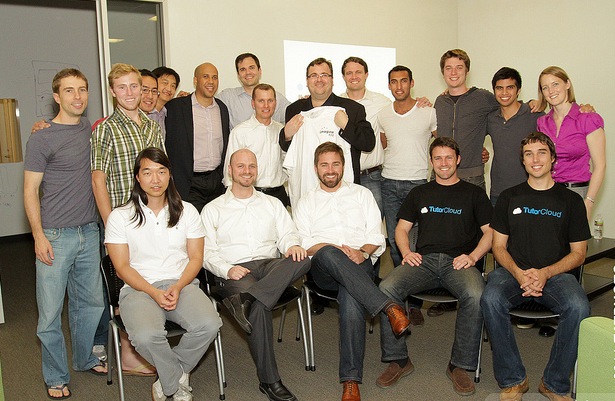The founders of Silicon Valley-based accelerator Imagine K12 believe we are amid a radical transformation in education.
[aditude-amp id="flyingcarpet" targeting='{"env":"staging","page_type":"article","post_id":721642,"post_type":"story","post_chan":"none","tags":null,"ai":false,"category":"none","all_categories":"business,","session":"B"}']Rather than teaching in batches, educators are looking for ways to help individual students learn. Imagine K12 believes one of its startups will produce the next great innovation in instruction.
And if the opportunity to resolve some of the U.S. educational system’s biggest problems isn’t enough, startups in the upcoming class will receive $100,000 in initial funding (up from $20,000).
AI Weekly
The must-read newsletter for AI and Big Data industry written by Khari Johnson, Kyle Wiggers, and Seth Colaner.
Included with VentureBeat Insider and VentureBeat VIP memberships.
I caught up with ImagineK12’s founders Tim Brady and Geoff Ralstan in the hours prior to the announcement of the accelerator’s funding boost and the establishment of a new “Start Fund” backed by big shots like LinkedIn CEO Jeff Weiner and Y Combinator founder Paul Graham.
Here’s what they had to say about the challenges of bringing disruptive new tech to American kindergartens and high schools — and how they answered one pretty big claim.
VentureBeat: Why did you decide to increase the initial investment?
Tim Brady: We need more great hackers and entrepreneurs in the space. Now we can give them more runway so they can get the traction they need to really be attractive to seed capital investors. The funds will give entrepreneurs enough time to get the right market fit so it can take root in the educational system.
VentureBeat: The media has accused ed-tech accelerators of failing to communicate with their real customers: teachers. Do you agree?
Brady: We take that kind of criticism extremely seriously. We haven’t heard it that often from our about our companies. We have a teacher in residence position and an educator day event. If teachers don’t like the product, they won’t download it from the Internet. We have products that are used in hundreds of thousands of classrooms, which is replacing bad software sold by big sales forces to a superintendents’ office.
[aditude-amp id="medium1" targeting='{"env":"staging","page_type":"article","post_id":721642,"post_type":"story","post_chan":"none","tags":null,"ai":false,"category":"none","all_categories":"business,","session":"B"}']
VentureBeat: Charter schools have a reputation for being early adopters for tech. Is this still the case?
Geoff Ralston: The charter schools have been great partners to sit down and talk to us. But they aren’t the only folk we are talking to, and not the only ones using our products. Even a few years ago, it was much more likely that a charter school would be more interested. But there has been a shift. Public schools are highly motivated to try new things — at least in the Bay Area.
VentureBeat: Are teachers increasingly the early adopters?
Ralston: In the past it’s been top-down — teachers haven’t had a say in what’s being developed. But the educators are increasingly adopting these products first. So we’ve gone to great lengths to educate them on what that means. And now, 10 percent of teachers are using our startups’ products.
[aditude-amp id="medium2" targeting='{"env":"staging","page_type":"article","post_id":721642,"post_type":"story","post_chan":"none","tags":null,"ai":false,"category":"none","all_categories":"business,","session":"B"}']
VentureBeat: But what these startups fail? The fallout must be far worse when it comes to ed-tech. Are teachers going to be disillusioned when startups like Alleyoop don’t deliver?
Brady: It happens — even to the larger players. Houghton Mifflin Harcourt declared bankruptcy. Of course, continuity is an issue. But we are very upfront with our teachers and our companies. We are also careful with the startups we select so we can avoid the big flameouts.
VentureBeat: And now you claim the Imagine K12 graduates have developed tech used by 10 percent of U.S. teachers. That number seems shockingly high.
Brady: The really cool thing about our space is that teachers talk to each other. They’ll say, “This is awesome, you should try it!” The same goes with parents, and kids who view these new tools as a key part of their academic success.
[aditude-amp id="medium3" targeting='{"env":"staging","page_type":"article","post_id":721642,"post_type":"story","post_chan":"none","tags":null,"ai":false,"category":"none","all_categories":"business,","session":"B"}']
VentureBeat: Yes, many of us can attest to the flaws with the current education system. We’ve all been students at some point.
Brady: Absolutely, but that doesn’t necessary make you an expert. If you understand a pain-point, it’s just the starting point. Entrepreneurs shouldn’t fall into the trap of using personal experience as a guide to evolving the product. For this reason, we’re looking for unique backgrounds — a teacher who is also a coder, for instance. That’s one of our big recent changes; we are trying to bring the hackers into the space.
VentureBeat: Is the resurgence of interest in ed-tech bringing in the “wantreprenerus”? Or is it a good thing?
Ralston: There is a lot more capital available, that’s for sure. And capital is a natural incentive to convince more great entrepreneurs to get into the space. But we are not creating throwaway consumer internet tools here — the end goal is to create better outcomes for children around the world.
[aditude-amp id="medium4" targeting='{"env":"staging","page_type":"article","post_id":721642,"post_type":"story","post_chan":"none","tags":null,"ai":false,"category":"none","all_categories":"business,","session":"B"}']
VentureBeat: How about the competition? Are there too many ed-tech accelerators?
Brady: Whether there are too few or two many accelerators, the long-term goal remains unchanged. Technology can help us with some of the biggest problems in the current system. We designed our school system in the age of the industrial revolution; we need to move to more individualized instruction.
VentureBeat: On that note, what’s the big goal? What gets you up in the morning?
Brady: We are at the beginning of a 20-year transformational period in education. Sixty-five percent of our kids only graduate from high school and don’t get the education they ought to get. The world is going to change radically — and we get to invent the great innovation that will make that happen.
[aditude-amp id="medium5" targeting='{"env":"staging","page_type":"article","post_id":721642,"post_type":"story","post_chan":"none","tags":null,"ai":false,"category":"none","all_categories":"business,","session":"B"}']
Read the full news story on Imagine K12’s new fund.
Imagine K12 meetup image via @Photo.
VentureBeat's mission is to be a digital town square for technical decision-makers to gain knowledge about transformative enterprise technology and transact. Learn More

